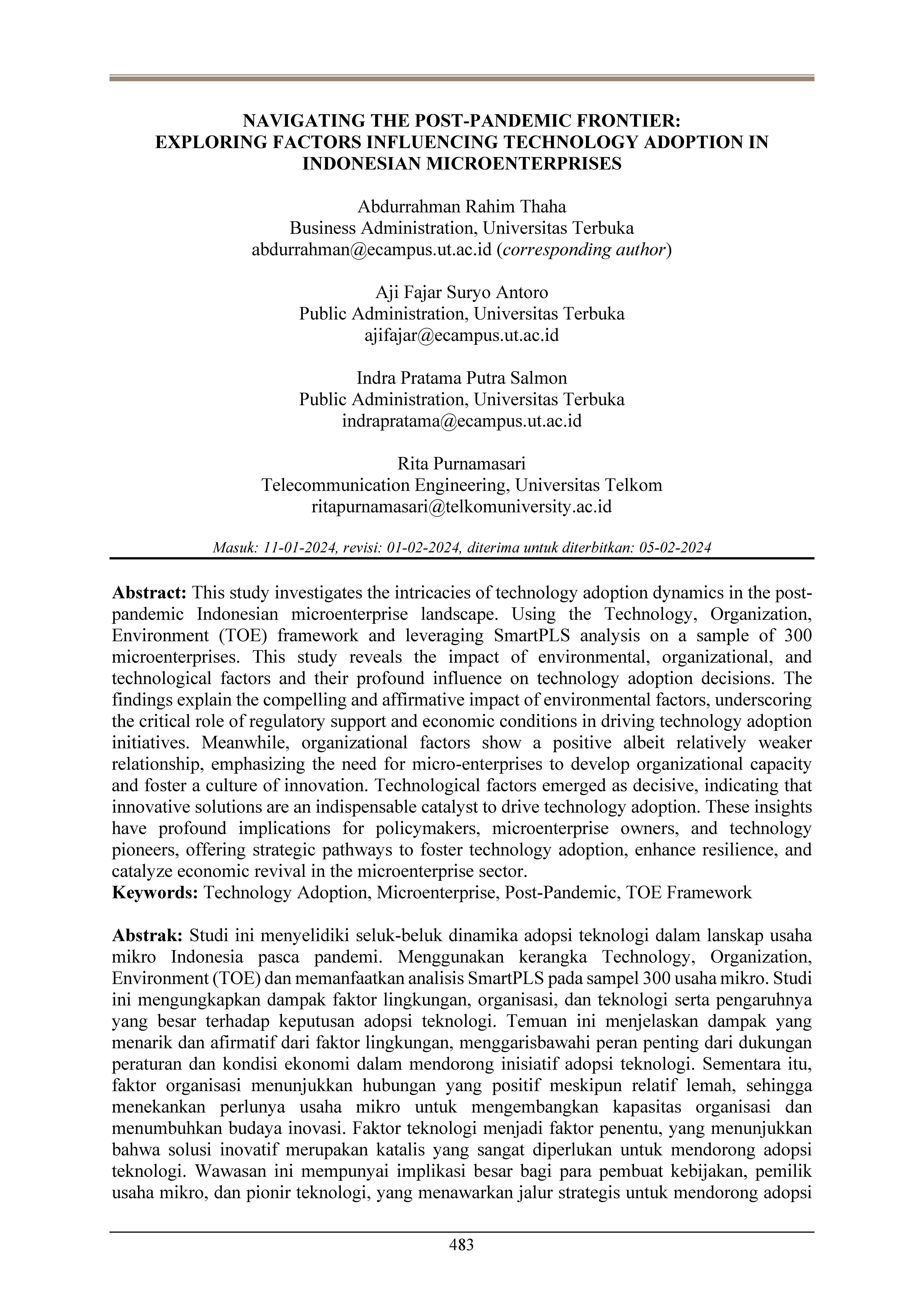Navigating the post-pandemic frontier: Exploring factors influencing technology adoption in Indonesian microenterprises
Main Article Content
Abstract
This study investigates the intricacies of technology adoption dynamics in the post-pandemic Indonesian microenterprise landscape. Using the Technology, Organization, Environment (TOE) framework and leveraging SmartPLS analysis on a sample of 300 microenterprises. This study reveals the impact of environmental, organizational, and technological factors and their profound influence on technology adoption decisions. The findings explain the compelling and affirmative impact of environmental factors, underscoring the critical role of regulatory support and economic conditions in driving technology adoption initiatives. Meanwhile, organizational factors show a positive albeit relatively weaker relationship, emphasizing the need for micro-enterprises to develop organizational capacity and foster a culture of innovation. Technological factors emerged as decisive, indicating that innovative solutions are an indispensable catalyst to drive technology adoption. These insights have profound implications for policymakers, microenterprise owners, and technology pioneers, offering strategic pathways to foster technology adoption, enhance resilience, and catalyze economic revival in the microenterprise sector.
Studi ini menyelidiki seluk-beluk dinamika adopsi teknologi dalam lanskap usaha mikro Indonesia pasca pandemi. Menggunakan kerangka Technology, Organization, Environment (TOE) dan memanfaatkan analisis SmartPLS pada sampel 300 usaha mikro. Studi ini mengungkapkan dampak faktor lingkungan, organisasi, dan teknologi serta pengaruhnya yang besar terhadap keputusan adopsi teknologi. Temuan ini menjelaskan dampak yang menarik dan afirmatif dari faktor lingkungan, menggarisbawahi peran penting dari dukungan peraturan dan kondisi ekonomi dalam mendorong inisiatif adopsi teknologi. Sementara itu, faktor organisasi menunjukkan hubungan yang positif meskipun relatif lemah, sehingga menekankan perlunya usaha mikro untuk mengembangkan kapasitas organisasi dan menumbuhkan budaya inovasi. Faktor teknologi menjadi faktor penentu, yang menunjukkan bahwa solusi inovatif merupakan katalis yang sangat diperlukan untuk mendorong adopsi teknologi. Wawasan ini mempunyai implikasi besar bagi para pembuat kebijakan, pemilik usaha mikro, dan pionir teknologi, yang menawarkan jalur strategis untuk mendorong adopsi teknologi, meningkatkan ketahanan, dan mendorong kebangkitan ekonomi di sektor usaha mikro.
Article Details

This work is licensed under a Creative Commons Attribution-NonCommercial-ShareAlike 4.0 International License.
This work is licensed under a Jurnal Manajemen Bisnis dan Kewirausahaan Creative Commons Attribution-ShareAlike 4.0 International License.
References
Al Hadwer, A., Tavana, M., Gillis, D., & Rezania, D. (2021). A systematic review of organizational factors impacting cloud-based technology adoption using technology-organization-environment framework. Internet of Things (Netherlands), 15, 100407. https://doi.org/10.1016/j.iot.2021.100407
Amornkitvikai, Y., Tham, S. Y., Harvie, C., & Buachoom, W. W. (2022). Barriers and factors affecting the e-commerce sustainability of Thai micro-, small- and medium-sized enterprises (MSMEs). Sustainability (Switzerland), 14(14), 8476. https://doi.org/10.3390/su14148476
Awa, H. O., Ojiabo, O. U., & Emecheta, B. C. (2015). Integrating TAM, TPB and TOE frameworks and expanding their characteristic constructs for e-commerce adoption by SMEs. Journal of Science and Technology Policy Management, 6(1), 76–94. https://doi.org/10.1108/JSTPM-04-2014-0012
Baker, J. (2011). The technology–organization–environment framework. In Information Systems Theory: Explaining and Predicting Our Digital Society (pp. 231–245). University of Hamburg. https://doi.org/10.1007/978-1-4419-6108-2_12
Bi, R., Davison, R. M., & Smyrnios, K. X. (2017). E-business and fast growth SMEs. Small Business Economics, 48(3), 559–576. https://doi.org/10.1007/s11187-016-9788-8
Bvuma, S., & Marnewick, C. (2020). An information and communication technology adoption framework for small, medium and micro-enterprises operating in townships South Africa. Southern African Journal of Entrepreneurship and Small Business Management, 12(1), a318. https://doi.org/10.4102/sajesbm.v12i1.318
Chatzoglou, P., & Chatzoudes, D. (2016). Factors affecting e-business adoption in SMEs: An empirical research. Journal of Enterprise Information Management, 29(3), 327–358. https://doi.org/10.1108/JEIM-03-2014-0033
Classen, R.-P., Garbutt, M., & Njenga, J. (2021). Factors influencing the adoption of digital technologies in South African SMMEs. International Conference on Information Resources Management (CONF-IRM), 1–12. https://aisel.aisnet.org/confirm2021/17/
Gui, A., Fernando, Y., Shaharudin, M. S., Mokhtar, M., Karmawan, I. G. M., & Suryanto. (2020). Cloud computing adoption using TOE framework for Indonesia’s micro small medium enterprises. International Journal on Informatics Visualization, 4(4), 237–242. https://doi.org/10.30630/joiv.4.4.458
Hassan, H., & Ogundipe, A. A. (2017). ICT adoption by micro and small scale enterprises in Nigeria: A case study of the Federal Capital Territory, Abuja. International Journal of Economic Research, 14(18), 117–137. https://doi.org/10.2139/ssrn.2951901
Joseph, E., & Dhanabhakyam, M. M. (2022). Role of digitalization post-pandemic for development of SMEs. In Research Anthology on Business Continuity and Navigating Times of Crisis (Vols. 1–2, pp. 727–747). IGI Global. https://doi.org/10.4018/978-1-6684-4503-7.ch036
Li, H., Liow, G., & Yuan, S. (2022). E-commerce adoption among micro agri-business enterprise in Longsheng, China: The moderating role of entrepreneurial orientation. Frontiers in Psychology, 13, 972543. https://doi.org/10.3389/fpsyg.2022.972543
Mahliza, F. (2019). The influence of e-commerce adoption using social media towards business performance of micro enterprises. International Journal of Business, Economics and Law, 18(5), 290–299. https://www.ijbel.com/wp-content/uploads/2019/07/ijbel5-VOL18_306.pdf
Matias, J. B., & Hernandez, A. A. (2021). Cloud computing adoption intention by MSMEs in the Philippines. Global Business Review, 22(3), 612–633. https://doi.org/10.1177/0972150918818262
Oliveira, T., & Martins, M. F. (2011). Information technology adoption models at Firm Level: Review of literature. The Electronic Journal Information Systems Evaluation, 14(1), 110–121. https://academic-publishing.org/index.php/ejise/article/view/389
Putra, P. O. H., & Santoso, H. B. (2020). Contextual factors and performance impact of e-business use in Indonesian small and medium enterprises (SMEs). Heliyon, 6(3), e03568. https://doi.org/10.1016/j.heliyon.2020.e03568
Raj, A., & Jeyaraj, A. (2023). Antecedents and consequents of industry 4.0 adoption using technology, organization and environment (TOE) framework: A meta-analysis. Annals of Operations Research, 322(1), 101–124. https://doi.org/10.1007/s10479-022-04942-7
Sarkar, S., & Clegg, S. R. (2021). Resilience in a time of contagion: Lessons from small businesses during the COVID-19 pandemic. Journal of Change Management, 21(2), 242–267. https://doi.org/10.1080/14697017.2021.1917495
Sheth, J. (2020). Impact of Covid-19 on consumer behavior: Will the old habits return or die? Journal of Business Research, 117, 280–283. https://doi.org/10.1016/j.jbusres.2020.05.059
Thaha, A. R., Maulina, E., Muftiadi, R. A., & Alexandri, M. B. (2022). TOE factors and value chain effects of e-business adoption on SMEs. Uncertain Supply Chain Management, 10(3), 1029–1036. https://doi.org/10.5267/j.uscm.2022.2.009
Tornatzky, L. G., Fleischer, M., & Chakrabarti, A. K. (1990). The processes of technological innovation. Lexington Books.


